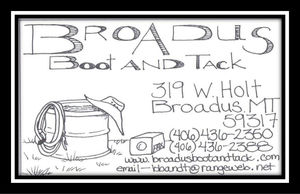30 Years Ago
From the Examiner Files
December 19, 2019
Thursday, December 21-28, 1989
The Outcasts of Pumpkin Creek (Childhood memories of Gene Mackin)
Baseball was the great Sunday afternoon pastime on Little Pumpkin Creek in the 1930s. My family rarely missed a game. In fact, the only game I can remember missing was during a diphtheria outbreak. One of my sisters had been exposed while babysitting. The doctor thought we could infect the whole county if we attended the game so he quarantined us and told us we’d be arrested if seen there.
A baseball team from Pumpkin Creek organized in 1932 and my brother Gardner signed on to sub when they needed a center fielder. I remember the pitcher, Al Pikkula, and the Roots brothers, Alex and Hugo. Other team members I only know by their last names: George, Steadman, Graham, Gustafson, Cain, and Reed.
Our team was the only one not named after a town. The other teams were Sonnette, Broadus, Coalwood, Powderville, Mizpah, Olive, and Doyle Creek. Even though our players all lived around the town of Loesch, they chose the name Outcasts because outcasts they were.
Hugo and Alex Roots, George, and Gustafson started the team. They had played with the Coalwood team, but in 1932 the team filled out its roster with the members of just two families with lots of sons. Feeling unwanted, they gathered together a new team. The league welcomed them, but didn’t think the re-tag Outcasts offered much competition for the veteran teams.
The team needed a field, so they cleared a sagebrush flat a mile below the Loesch School. They ran a chalk line at the edge of the field to indicate home runs. Of course, if the ball got lost in the outfield sagebrush, it was an automatic two-base hit. Add a chicken wire backstop, bases, and benches for the teams and play ball!
Equipment was scarce during the thirties. Many of the Outcasts didn’t even have gloves. They either used their work gloves or the visiting teams generously leave their gloves in the field when they went in to bat. The Broadus team, in crisp uniforms, adapted to the sagebrush flat as well as the Outcasts in their tee shirts and jeans.
Each week the Powder River Examiner gave details of the games. The headlines read: WINS OUT IN 9TH INNING. Coalwood took a close game from the Outcasts at the Outcast field with the score 13 to 12.
My sisters and I drove over to the field for every home game to cheer them on. There were no bleachers for the spectators. People sat in or on their cars, depending on the wind and the sun. You’d most likely find me squatting in the dust along the baselines. In Eastern Montana, games were seldom called for rain.
The Cain family usually joined us. They didn’t have to drive to the games; they lived just over the hill from the field. They were a crowd in themselves with 15 kids. There was Shorty, Fatso, Bullet, Horace, Sal, Tutor, Tat, and Buster. The rest I didn’t know as well.
The spectators supplied the umpires. They could be counted on to be biased towards one team or the other. This is why fist fights behind the line of spectator’s cars occasionally provided a side show for the games.
That year Broadus had a winning streak. They won more games during the season than any other team. The articles in the Broadus Examiner crowed of their success. The baseball stories started on page one and continued to page six. Every detail of the game was listed.
The most exciting game of the regular season took place on the first Sunday of September, 1932. The headlines read: 15 INNINGS NECESSARY TO DECIDE GAME.
The stage was set for the playoffs. Broadus won the most games by a large margin; but, the runner-ups were the upstart Outcasts.
The first Sunday of October we were all in Broadus for game one of the playoffs. I think Pumpkin Creek was left deserted. Our team didn’t disappoint us. The Outcasts took the first game 11 to 9.
The Pumpkin Creek fans were jubilant. My sisters had carried lemonade and homemade ice cream to the games to soothe our throats from cheering and cheering. Every bit of it was needed.
Two weeks later, Broadus came to Pumpkin Creek. Four hundred people ringed the Loesch field. This day belonged to the Broadus team; the final score: 15 to 6. The headlines that week proclaimed the playoffs the “little world series.”
The deciding game took place on the first Sunday in November, in Broadus. The game was close throughout. Broadus would score then the Outcasts would score. Finally, it was the bottom of the ninth, with the Outcasts 13 to Broadus’ 10. Broadus was at bat.
Could the underdog Outcasts hold them and win the playoffs? It was all in the hands of the Outcast pitcher, Al Pikkula. We stood in hushed tension as Al proceeded to load the bases with runners. Broadus fans were going wild.
Pikkula reached inside himself and found some hidden reserve. He tossed a runner out at the plate trying to steal home. Then he struck out a batter. We roared encouragement and prayed.
Our prayers were answered. Strike one. Strike two. Strike three! The Outcasts win! The Pumpkin Creek fans rushed the field singing the praises of their mighty Outcasts.
All too quickly the magical winning season was over. The years that followed brought drought and more baseball to Eastern Montana. Unfortunately, the Outcasts never again lived up to their first season success.
Then World War II started. Ball players became soldiers, and we were suddenly cured of baseball fever. Teams dissolved for lack of players. Gardner joined the Army Air Corps and claimed he was four years younger than he was so he could train as a pilot. He flew with Chenault in Burma and China. When his plane was shot down, we never heard from him again. The baseball games at Outcast field became my fondest memories of my oldest brother.
A Montana Centennial Project
Written by Carole Mackin








Reader Comments(0)